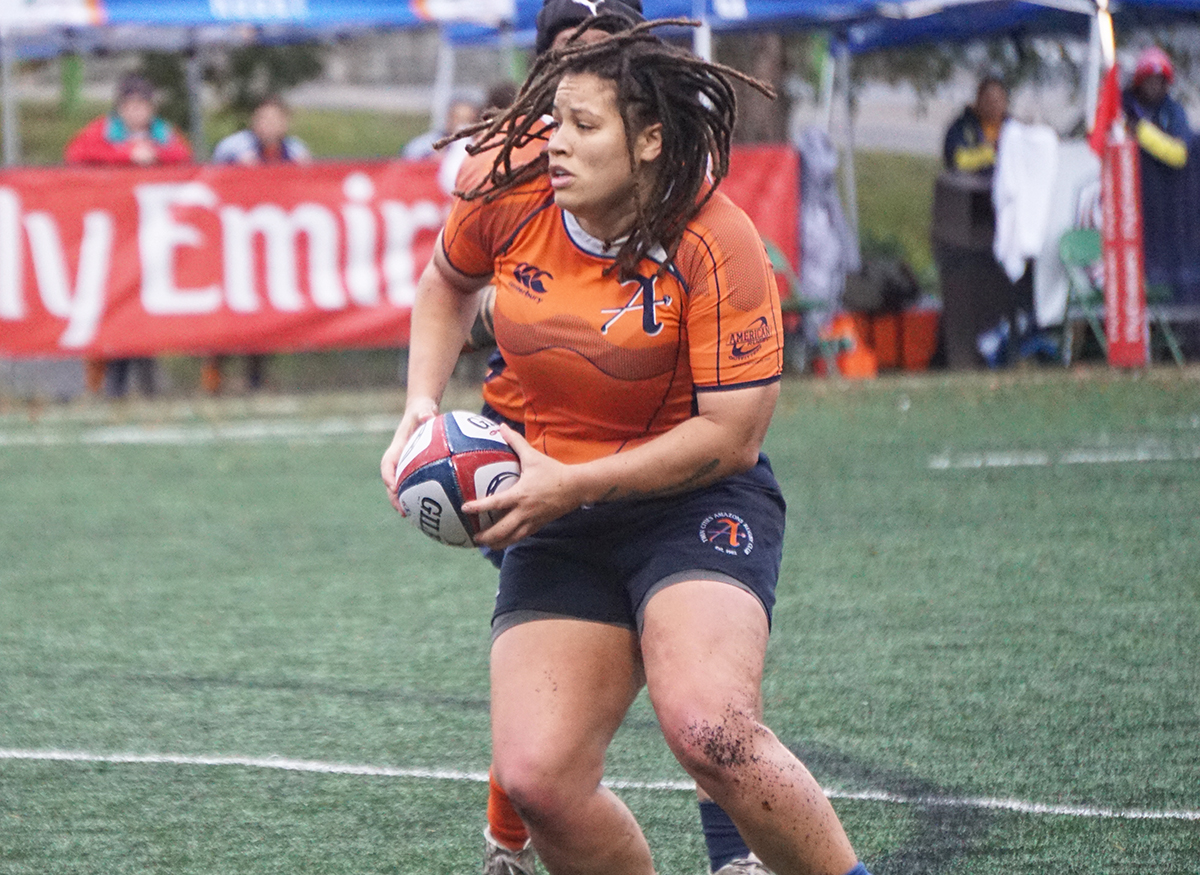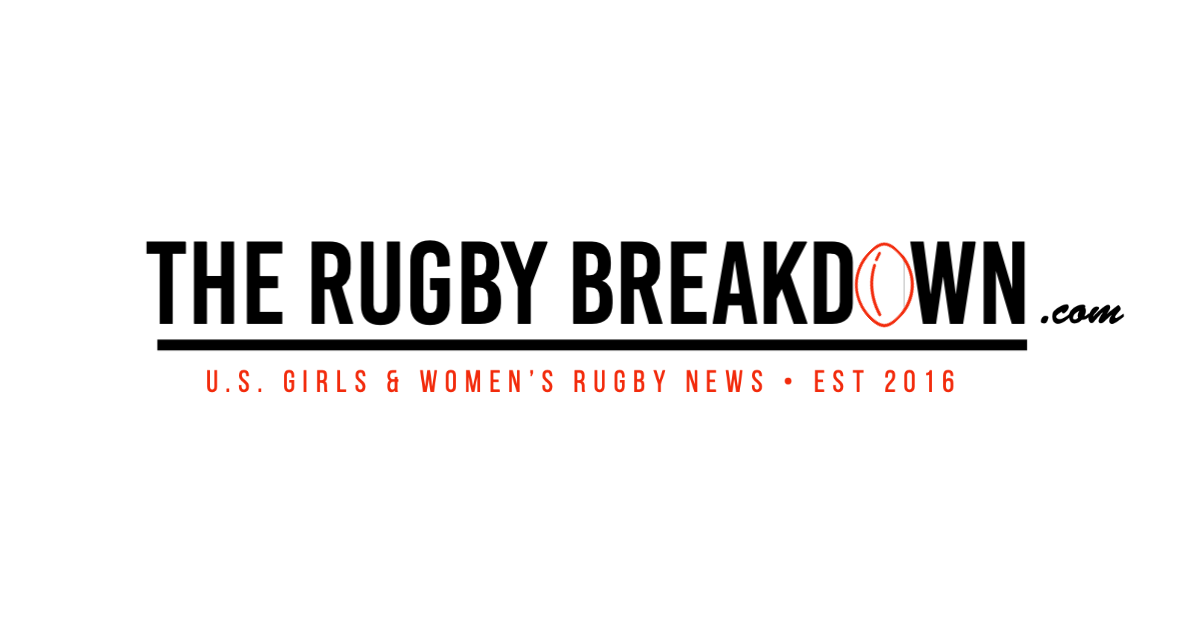
Eagle Katana Howard with the Twin Cities Amazons
USA RUGBY – There comes a point where we must ask ourselves what we stand for.
Beyond fleeting thoughts, short-lived ideas and the compelling circumstances that drive our voices out in the moment, only for the hectic nature of life to feed our forgetful minds.
Since the horrific death of George Floyd, the global community has opened its eyes. It has seen that on one too many occasions, we become enveloped in the things that are most important to us, unaffected by what happens outside of our bubble.
Until one day, something happens that cannot be ignored. That has no reason, no logic and forces our hand into action — any action — to show what we truly believe.
What was once a silent standard, is no longer the way forward.
Over the past couple weeks, several members of USA Rugby’s senior national teams joined peaceful protests for Black Lives Matter. Many more have used their platforms to speak against racial injustice at a time when silence is no longer an answer.
Deep in the necks of Los Angeles, Stephanie Rovetti and Meya Bizer joined 30,000 people to march through Hollywood. It would have been LA’s pride festival. Instead, it was dedicated to Black Lives Matter.
In San Diego, Matai Leuta, Malon Al-Jiboori and Kevon Williams embedded themselves in Balboa Park with individuals from all walks of life.
Kris Thomas, Alena Olsen and Ashlee Byrge also took to the streets of Southern California, while Kristine Sommer joined the thousands in Seattle’s Capitol Hill and Alycia Washington spread across New Hampshire.
At ground zero, Katana Howard spent hours peacefully marching in Downtown Minneapolis with friends, family and a community that cried out in a momentous desire for change.
“No Justice, No Peace! Say his name! George Floyd,” said Howard, describing some of the many chants that echoed from the streets of downtown. “As we arrived to march, there was either music playing or someone talking on a loudspeaker to talk to everyone. It was very peaceful. People respected the person speaking and our moments of silence as well.”
Howard saw support from every corner of the crowded Minneapolis streets. Passerby cars honked in unison with protest chants as residents of neighboring apartments came to their balconies to lend a voice. It was an encouraging scene.
“It made me feel even closer to the city I love,” she said.
In Seattle, Kristine Sommer and her fiance felt a whirlwind of emotions.
“I was sad, angry, and yet – optimistic. To see everyone standing for justice, for equality is such a powerful scene. We’re all fighting for better communities and for better futures. I was motivated to continue to fight for the cause after I left.”
For athletes, especially those who play for their country, sport carries meaning in a different way. It isn’t simply a beacon of triumph and entertainment, it’s a platform to leverage in favor of achieving something much bigger than any one player or team; something that ripples an impact across the globe and ignites a meaningful difference in thought or action.
Enough of this changes a community, even more can transform a world.
“People look up to athletes no matter how small or big your platform is, there’s always someone watching,” said Malon Al-Jiboori after marching from Balboa Park to Downtown San Diego.
“it gave me chills being involved in something that’s bigger than myself and anything I’ve ever done. During these times, it’s important that we come together for this movement and support each other no matter what our skin color is.”
Anyone who knows rugby also knows that it thrives on values.
For one of the oldest sports the world has known, culture still reigns supreme. Regardless of size, shape, gender, background, religion, sexual orientation and many other distinguishing factors — rugby creates a space for everyone.
And as a sport that carries the torch for inclusion, athletes from the most diverse country in the world have found parallels that are too applicable to ignore.
“We as a rugby community believe the value and power that diversity has,” says Stephanie Rovetti, “and as an athlete that represents this country, I think it’s important to raise awareness on the issues we face on a daily basis. Awareness and education are the first steps in constituting change.”
As the deaths of George Flloyd, Breonna Taylor and countless others weigh heavily on the hearts and minds of citizens of the world, so too does the price of silence.
“At first I was nervous to say anything, worried that what I say might be wrong or do more harm than good,” said Meya Bizer, describing her innate desire to help and acknowledging her struggle to know exactly how.
“My teammates showed me that taking a stand and outwardly showing my support is the best thing I can do. I may mess up, but I will learn from it. It was a privilege to do this and I’m committed to doing what I can in the future.”
Like Bizer, many individuals struggle to know what they can do or how they can help; recognizing the immense impact the death of George Floyd has had on those of us who didn’t fully understand the depths of systemic racism.
While sport is a beacon for unification, freedom and unbiased opportunity, it is also a necessary medium to raise awareness for the things that matter, underneath the surface of our daily, hectic and complex lives. What players and fans connect with so deeply on the field will vibrate in spades if used for good measure off of it.
“If everyone commits to doing at least one thing, it should be to learn as much as possible about systemic racism and how it has shaped many, many lives,” said Katana Howard.
“Educate yourselves and encourage education in others,” said Stephanie Rovetti. “Donate to organizations supporting the movement, take political action by voting, signing petitions, attending local events and always keep listening and learning with compassion.”
“Start small,” said Meya Bizer. “Have conversations with family and friends if/when needed. Break the silence. Do it with love and tenderness, but don’t shy away in fear of hurting their feelings. It starts at home and from there it builds.”
“There are numerous things that can be done including protesting, calling numbers and signing petitions,” said Malon Al-Jiboori. “One of the most important things someone can do is get educated or research the history of African Americans. For example, the 1921 Tulsa Race Riot happened where I was raised and I never learned about it in school.”
“Have the ‘tough’ conversations with those around you about race,” said Kristine Sommer. “I’ve had these conversations myself the past few weeks and should have started much earlier.”
One day, and one day soon, we will find our way back to sport. And when we do, we can’t afford to get so caught up in the moment, that we forget how the world has changed — how it must continue to change. For the better, for us all, for Black lives.
5 WAYS TO SUPPORT BLACK LIVES MATTER
- Educate yourself on systemic racism and African American history
- Subscribe to vote and familiarize yourself with local officials who oversee police reform and criminal justice
- Donate to Black Lives Matter and other charities fighting racial injustice
- Attend a peaceful protest in your area
- Have difficult conversations with friends and family to bring awareness to racist remarks


